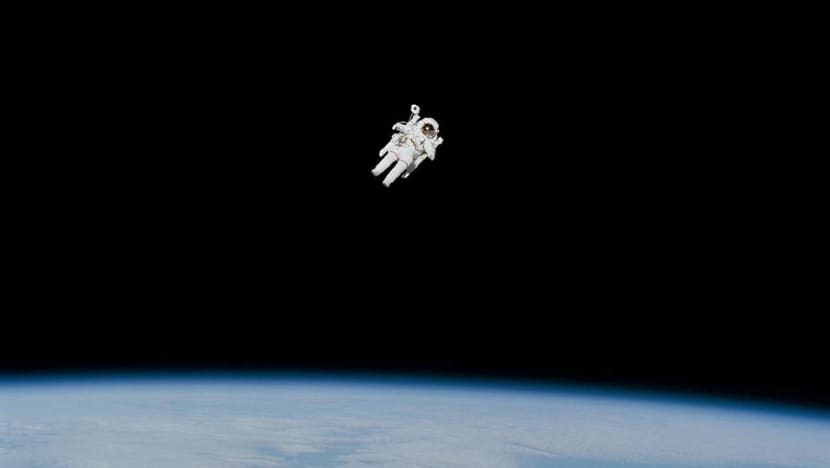commentary Commentary
Commentary: Even NASA thinks a sense of humour is a must in hiring astronauts
The journey to Mars is a laughing matter – and there are good reasons why the most stressful jobs are best filled by candidates with a good sense of humour, says NUS Business School’s Sam Yam Kai Chi.

NASA astronaut Serena Aunon-Chancellor, Roscosmos cosmonaut Sergey Prokopyev and German astronaut Alexander Gerst set off in June (Photo: AFP/Vyacheslav OSELEDKO)
SINGAPORE: Astronauts are wanted for a three-year space mission; most of it cramped in a spacecraft with no personal space, two or three other travellers for company, and limited contact with home.
A must-have? A good sense of humour.
Last week, researchers advising NASA, the US space agency, revealed that the ability to clown about will be a crucial skill required for participants in the first manned mission to Mars.
In the vacuum of space, where no one can hear you laugh, you might not think that being able to tell a good joke would be high on the job description.
The standard portrayal of astronauts tends to focus on the clear thinking, cool-under-pressure types of the kind that survived near certain death on Apollo 13. This, after all, really is rocket science.

A SENSE OF HUMOUR INCREASINGLY IMPORTANT
But a growing body of research shows that a sense of humour - being able to both make and take jokes - plays a critical role in driving successful group dynamics, building strong teams and creative thinking.
Studies have shown laughter relieves stress, boosts engagement and collaboration, and can raise analytic precision and productivity.
READ: Being funny at work can be good for your career, a commentary
One study, for example, found that workers who had watched a comedy clip were 10 per cent more productive than colleagues who had not. It has also been found that cracking jokes at work can make people seem more competent - and hence, perhaps, more trustworthy.
A roundtrip mission to Mars is targeted for lift-off in the next two decades. It will involve travelling millions of kilometres from home, packed inside a capsule no bigger than a studio apartment and living constantly a hair’s breadth from disaster.
In such high-pressure environments, why does humour matter?
“Groups work best when they have somebody who takes on the role of class clown,” Dr Jeffrey Johnson, one of the researchers working with NASA, told the annual meeting of the American Association for the Advancement of Science.
Jokers, he said, “have the ability to pull everyone together, bridge gaps when tensions appear and really boost morale.”
Johnson’s findings came from his own on-location experience studying workers at isolated fishing camps in Alaska, as well as several scientific expeditions to Antarctica which often last several months.
WHY HUMOUR IS NEEDED IN SPACE
Deep space travel is among the most psychologically-demanding work situations imaginable. Yet there are also clear parallels with more Earthly endeavours, where teams are forced to work closely together, making rapid mission-critical decisions independently.

On missions to Mars, the vast distances will mean contact with Earth will become increasingly difficult. Radio transmissions take up to 24 minutes to reach Earth and the same time for a reply to be received. For most of the mission, the astronauts will have to work and make vital decisions on their own – creativity and problem solving are really going to matter.
That makes effective teamwork essential, which means ensuring those chosen for the mission trust each other deeply and collaborate effectively in the most challenging situations. A key element of this is building likeability.
BEING LIKABLE MATTERS
In my own research at NUS Business School I have found that having a sense of humour plays an important role in generating likeability among team members. Humour, in this case, can take the form of making jokes, in laughing at jokes made by others - even when you don’t actually find them particularly funny - and in laughing at yourself.
This is closely related to the choice between working with competent jerks versus loveable fools. In the overwhelming majority of cases, individuals will prefer to work with the loveable fool – simply because, when it comes to work, likeability matters more to teamwork than competence.
In another study we found that the wrong kind of jokes, especially when coming from a leader, can actually increase misbehaviour and deviance among co-workers.

READ: Why there will always be a place for the office jerk, a commentary
This is because some forms of humour, particularly the more risque kind, can send signals to colleagues that it is okay to break rules, opening the way to potentially serious negative consequences.
What then is a sense of humour and how then do we define something as funny?
LAUGH AT YOURSELF
One approach that is gaining increasing popularity is the concept of Benign Violation Theory, first developed by the Humour Research Laboratory at the University of Colorado, Boulder. In short, this says that for an individual to find someone’s joke funny, a social norm must be violated while simultaneously it must be received as not threatening or causing real harm.
For example, while many people tend to find off-colour jokes funny, the same jokes become offensive when the targets of the jokes are their loved ones. This also highlights an important point on the application and use of humour: A joke that one person finds hilarious may be deeply offensive to another.
So while a sense of humour is important, it is equally important that the person has the social awareness to tell the right kind of jokes and at the right time.
It’s likely this also explains why research has consistently found that the best kind of jokes for building teamwork are the ones that are self-deprecating - in other words, laughing at oneself.
Space exploration is well known for having generated many spin off discoveries used on Earth - from advanced computer processors to scratch resistant lenses and freeze dried food. As NASA’s researchers look to put together a team for the first Mars mission, space travel also promises to help push our understanding of human psychology and how teams work here on Earth.
Humour, it seems, is a serious business.
Sam Yam Kai Chi is assistant professor in the Department of Management and Organisation at the National University of Singapore (NUS) Business School. The opinions expressed are those of the writers and do not represent the views and opinions of NUS.















